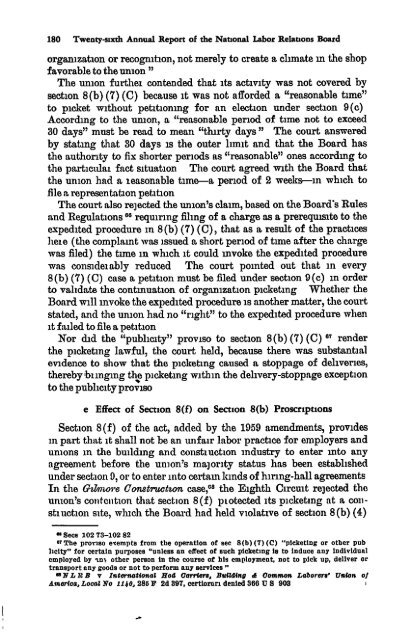TWENTY-SIXTH ANNUAL REPORT - National Labor Relations Board
TWENTY-SIXTH ANNUAL REPORT - National Labor Relations Board
TWENTY-SIXTH ANNUAL REPORT - National Labor Relations Board
You also want an ePaper? Increase the reach of your titles
YUMPU automatically turns print PDFs into web optimized ePapers that Google loves.
180 Twenty-sixth Annual Report of the <strong>National</strong> <strong>Labor</strong> <strong>Relations</strong> <strong>Board</strong><br />
organization or recognition, not merely to create a climate in the shop<br />
favorable to the union"<br />
The union furthei contended that its activity was not covered by<br />
section 8(b) (7) (C) because it was not afforded a "reasonable time"<br />
to picket without petitioning for an election under section 9(c)<br />
According to the union, a "reasonable period of time not to exceed<br />
30 days" must be read to mean "thirty days" The court answered<br />
by stating that 30 days is the outer limit and that the <strong>Board</strong> has<br />
the authority to fix shorter periods as "reasonable" ones according to<br />
the particulai fact situation The court agreed with the <strong>Board</strong> that<br />
the union had a ieasonable time—a period of 2 weeks—in which to<br />
file a representation petition<br />
The court also rejected the union's claim, based on the <strong>Board</strong>'s Rules<br />
and Regulations 66 requiring filing of a charge as a prerequisite to the<br />
expedited procedure in 8(b) (7) (C), that as a result of the practices<br />
hen (the complaint was issued a short period of time after the charge<br />
was filed) the time in which it could invoke the expedited procedure<br />
was considei ably reduced The court pointed out that in every<br />
8(b) (7) (C) case a petition must be filed under section 9(c) in order<br />
to validate the continuation of organization picketing Whether the<br />
<strong>Board</strong> will invoke the expedited procedure is another matter, the court<br />
stated, and the union had no "right" to the expedited procedure when<br />
it failed to file a petition<br />
Nor did the "publicity" proviso to section 8(b) (7) (C) 67 render<br />
the picketing lawful, the court held, because there was substantial<br />
evidence to show that the picketing caused a stoppage of deliveries,<br />
thereby iblinging the picketing within the delivery-stoppage exception<br />
to the publicity proviso<br />
e Effect of Section 8(f) on Section 8(b) Proscriptions<br />
Section 8(f) of the act, added by the 1959 amendments, provides<br />
in part that it shall not be an unfair labor practice for employers and<br />
umons in the building and constiuction industry to enter into any<br />
agreement before the union's majority status has been established<br />
under section 9, or to enter into certain kinds of hiring-hall agreements<br />
In the Gthmore Construction case," the Eighth Circuit rejected the<br />
union's contention that section 8(f) pi otected its picketing at a con -<br />
stiuction site, which the <strong>Board</strong> had held violative of section 8(b) (4)<br />
" Secs 102 73-102 82<br />
57 proviso exempts from the operation of sec 8(b) (7) (C) "picketing or other pub<br />
licity" for certain purposes "unless an effect of such picketing is to induce any individual<br />
employed by xn1 other person in the course of his employment, not to pick up, deliver or<br />
transport any goods or not to perform any services"<br />
se NLRB v International Hod Carriers, Building d Common <strong>Labor</strong>ers' Union of<br />
America, Local No 1140, 285 F 2d 397, certiorari denied 386 LI S 908

















